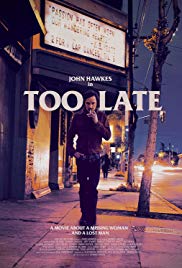
TOO LATE
US, 2015, 107 minutes, Colour.
John Hawkes, Crystal Reid, Dichen Lachmann, Natalie Zea, Dash Mihik, Joanna Cassidy, Jeff Fahey, Robert Forster, Sydney Tamila Poitier, Ride a Strong, Vail Bloom.
Directed by Dennis Hauck.
Since the 1990s and the release of Pulp Fiction, a thriller which is not constructed in strict chronological order is often described as Tarantinoesque. This is particularly true of this thriller.
It is been filmed in five 20 minute segments – but not presented in chronological order. This can be tantalising dramatically for the audience – but also irritating for some who find it too difficult to follow.
A young stripper is murdered in a Park in Los Angeles. She has been seen with two drug dealers as well as a Park Ranger. We find that she has approached a private detective who then feels obliged to investigate the case. This involves him in dealing with an arrogant owner of a club and his associate, the mother of the girl, other connections with the girl. And, as with Pulp Fiction, we have to be alert as to which of the segments contains the ending.
The film has a very strong cast led by John Hawkes as the private detective. Perhaps too experimental for many general audiences, but interestingly tantalising for those who appreciate the Tarantinoesque.
1. 21st-century film noir, filmed in Los Angeles sunshine as well as darkness?
2. The complexity of the plot? Audiences having to fit the jigsaw pieces in time chronology? The impact of seeing the plot not in chronological order? The demands on the audience in making connections?
3. The technical bravura of the film, five chapters, single takes of 20 minutes or more? The amount of plot in each chapter? The behaviour of the characters in each chapter? The complexity of the situations? The audience having to go backwards and forwards in time to appreciate the narrative?
4. The noir plot: strippers and dancers, clubs, owners, exploitation; the private detective, the past encounter with the stripper, her asking his help, the discovery of her body, his interviews, parents, grandparents, club owners; the introduction of the Ranger, the two drug dealers and thinking the stripper had overdosed on their drugs; the behaviour of the detective, the solving of the situation, the final effect on him?
5. Sampson as the private detective, John Hawkes and his screen presence, appearance, life and investigations, asked for help, visiting the clubs, the encounters with Dorothy, her death, the deals and the Ranger, Gordy and the clubs and his associate, other dancers, mother and grandmother? The final year passing, the driving, the encounter, death?
6. Dorothy, the situation, the clubs, stripping, men, seeking help, her family, her death?
7. The club owner, his wife, sex and compromise, revenge, Fontaine as his associate? His wife killing him and the associate, affluence and sleaze?
8. The drug dealers, incompetent, feeling guilty, running away?
9. The women in this kind of story, the grandmother, incompetent mother, dancers and strippers, murder victims?
10. Commentators making the Tarantino link, the shifting of times, the demands on audiences, the lengthy moments of dialogue, tongue in cheek and ironic?
11. The success of the film as a 21st-century film noir?